How I Went from Hating School to Doing a PhD in Physics
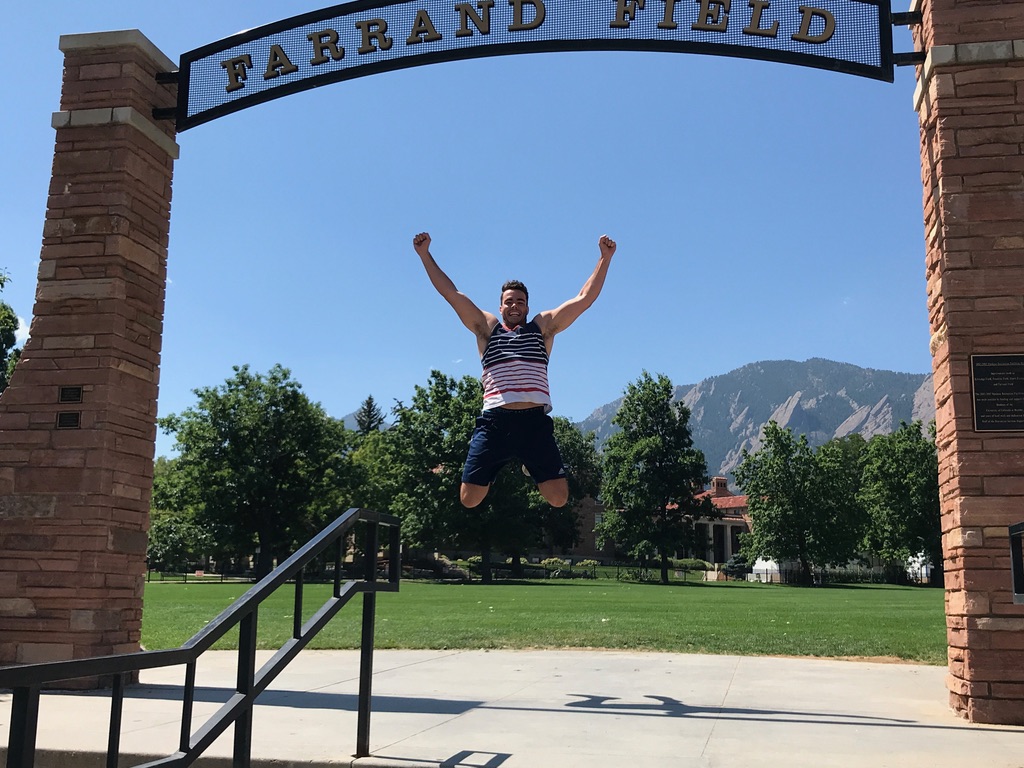
This post is primarily aimed at students of Freedom Area High School. Many of whom, like me in high school, had no idea what physicists did (let alone how to become one).
The High School Years
From Art to Physics
Growing up, I played nearly every sport I could: baseball, football, basketball, and even soccer and wrestling at some point. I was decent at most of them and enjoyed playing very much. Sadly, when I was in about 8th grade I started having such bad knee pain from growing that I chose to quit sports altogether. I now had a bunch of free time and ended up filling most of it with Call of Duty and art. In addition to spending 4-5 hours a day becoming what some people have called the greatest video gamer of all time, I was pouring a lot of time into graphic design and video editing. I entered high school knowing, without a doubt, that I would be going to school for graphic design. So, I also knew, without a doubt, that I did not need to try in my other classes...
It was in the second quarter of my sophomore year that I saw my transcript for the first time. I remember feeling really dumb when I saw how low the number was: 2.6/4.0. My whole freshman year, I thought it was really not cool to apply yourself in school. I spent my time drawing in class despite every teacher urging me to put more effort into my actual coursework. Looking back, I am surprised I was so set in my ways. Although everything happens for reason, I definitely regret not taking their advice.
I do not know if it was the embarrassment from seeing my transcript or what, but in the second quarter of my sophomore year, I started looking into possible careers in science and math. At the time, I was watching Big Bang Theory a lot and, as silly as it is, I think seeing a physicist, however fictional, piqued my interest. I distinctly remember, going to Barnes and Noble in the fall of 2013 and buying my first two physics books: \(E=mc^2\): Simple Physics: Why Balloons Rise, Apples Fall & Golf Balls Go Awry by Jeff Stewart and Relativity by Albert Einstein. At the time, this seemed logical. The first book's final chapter was on relativity so I figured I would just finish that one and the read the real deal. Of course, I had no hope of understanding relativity after one small chapter on it. Nonetheless, I vividly remember reading the first 7 chapters that night. This had to have been 5 or 6 hours of reading and I stopped when I got confused with the relativity chapter. That was it, though, I knew from that point on that I wanted to learn everything I could about physics.
From 2.6 GPA to Founder of the Physics Club
My interest in physics was sustained through all of 10th grade, despite not yet being able to take physics. Nonetheless, because I had a new goal of going to school for physics, I started trying in all of my classes. From the second quarter of my sophomore year onward, I got a 4.0. For me, all it took was having an academic-related goal. This supplied more than enough motivation for me to apply myself in all my classes. I started really enjoying learning about everything, not just physics.
It was in tenth grade that I started to appreciate the fact that all knowledge is interesting and potentially useful in some way. While I, of course, hope all students start high school with a desire to learn, I want to emphasize that it is never too late to start trying. I wish I could go back and at least put in some effort my freshman year. Until I found physics, though, I just did not enjoy school. It seemed like a burden and a misuse of time. Then, nearly overnight, one book changed my mind. So, I encourage all high school students to study broadly in school, through extracurriculars, by reading extensively, and by using the internet as the phenomenal educational resource that it is. Find what makes you genuinely happy and the pursue that will all your energy. Or as my favorite physicist Richard Feynman said
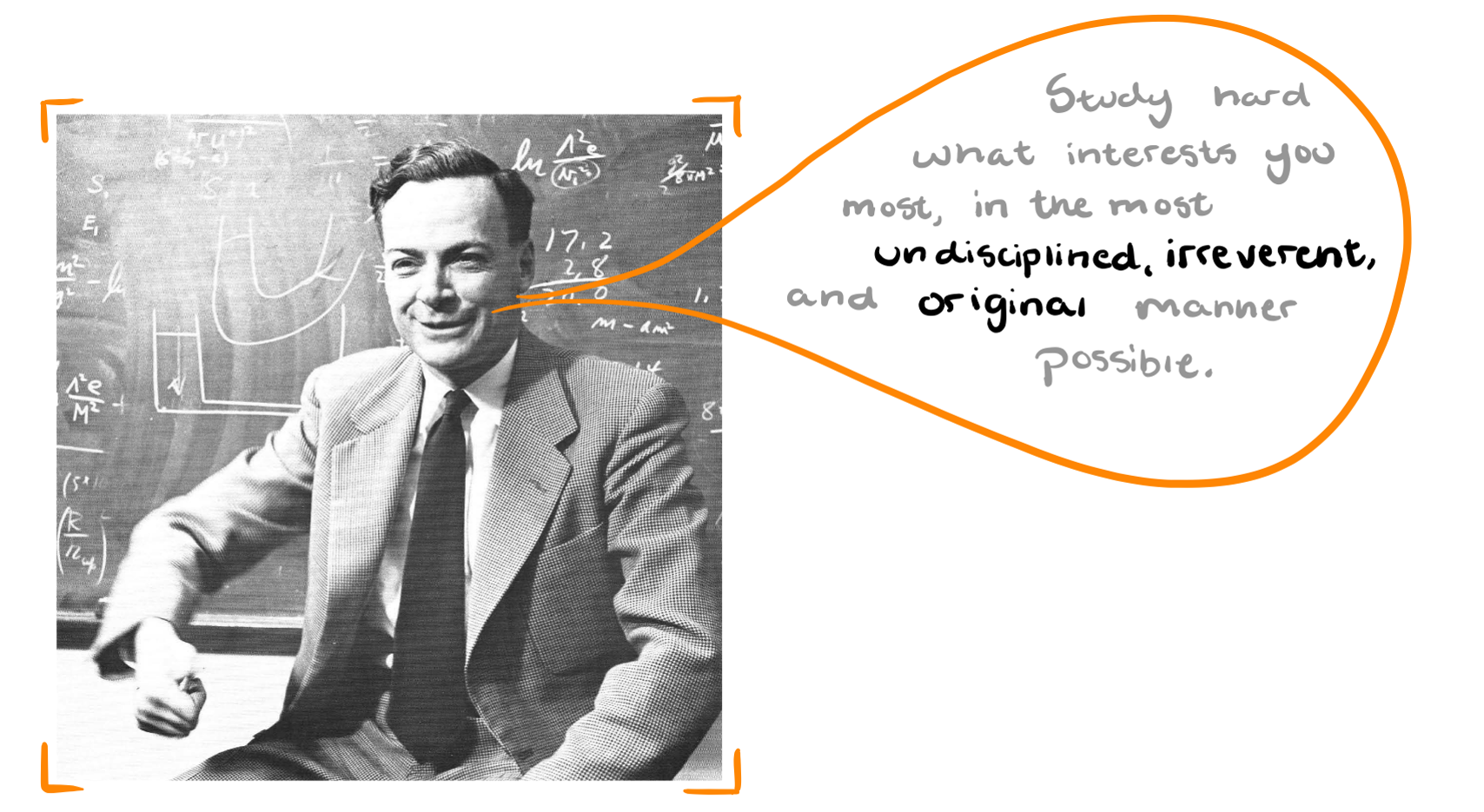
Undergraduate Years
Small School, No Debt
I chose to attend Clarion University of Pennsylvania for a very simple reason: a recruiter came to my high school and told us about their scholarships. I knew I was paying for school myself, so I wanted to minimize cost. Their tuition scholarship depended entirely on your GPA and SAT scores. Though, I do not agree with this necessarily, I knew I had to play along. So, I worked very hard to prepare using Khan Academy and other free or cheap resources to prepare. I managed to get a 1500/1600 and, as a result, payed $0 in tuition for my entire time at Clarion. This is a massive benefit of small state school and I encourage anyone at Freedom or elsewhere to consider this option. The crushing reality of student debt is one that can be avoided with enough planning ahead of time. In a future post, I will dive into the various options for an undergraduate education. For now, I will sketch what the rest of my time at Clarion was like.
Because it was such a small school, I was able to make personal connections with faculty from day one. This is almost certainly not possible at a large research university. Moreover, my classes were never more than 20 or 30 people, so I always felt comfortable asking questions and I knew a lot of my classmates closely. Of course, there were many downsides, but again, I defer that to a later post.
So, everything was going well and I got involved in research from the very beginning. Sure, it was not what I eventually wanted to be doing, but I took any opportunity I could. This led to a fantastic opporunity to participate in an astronomy observing run at McDonald Observatory in the Davis mountains of West Texas.
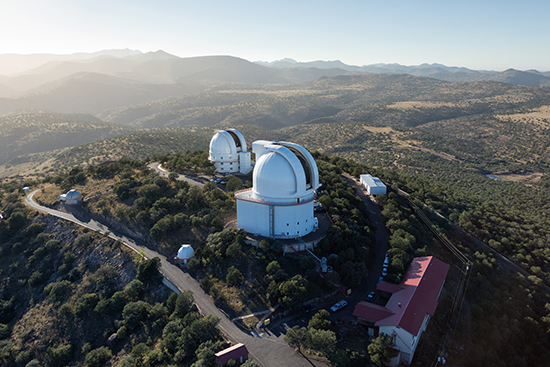
I am incredibly indebted to Dr. Sharon Montgomery, my academic and first research advisor, for this opportunity. It led to a poster presentation at the American Astronomical Society's meeting. Even more importantly,though, the research experience made my application to my first summer internship far more competitive.
Gravitational Waves in Birmingham
In the lead up to summer of 2016 I was rejected from 6-8 research experiences for undergraduates (REUs). For starters, I did not have any research experience and it seems getting the first position is particularly difficult. Moreover, I was only headed into my second year of undergrad so I would have been a charity case for whoever (whomever?) hired me. Lastly, and this is the kicker, I only applied to incredibly selective programs because I did not know any better (Harvard, MIT, etc). The process of preparing for, and applying to research internships warrants a post of its own, so I will make one soon. My point of saying any of this here is to make it clear that I did not just apply to one place and get accepted. I worked hard, had great letters of recommendation, and got lucky enough to get an interview for an international REU in gravitational wave physics hosted by the University of Florida. The interview went reasonably well and a couple months later I shot out of bed when I saw the email from the organizers:

At this point, I had not yet had quantum mechanics, I did not really know what quantum mechanics had to do with gravitational wave detection, and I did not know who Andreas Freise was. Nonetheless, I immediately accepted the offer and was excited to move to Birmingham, England for the summer. I think the take-away I would like young students to have is this: everyone starts somewhere, and the most qualified people do not always get the positions. There are lots of factors, in addition to luck, that govern who gets what position. So, present your self well, research a lot of different opportunities, and cast a wide net. Again, more on this in a future post.
All I know is that if I had to point to one email that changed my life more than any other, I think I would choose this one. I believe it was because of my successful summer research experience that I was able to secure letters of recommendation for the graduate fellowships I applied to the following year. If you happen to be interested in what I worked on, you can find my summer report here. Keep in mind, though, that I had not yet taken quantum mechanics and the report was the first document I had ever made in LaTeX... So, please keep that in mind if you check it out. Nonetheless, the project got me hooked on quantum optics and significanlty changed the course of my career for the better.
In addition to being a incalculable boost to my academic career, it was also a phenomenal period of personal growth. Living in a new country for several months forced me to grow up in many ways. Added benefits of the experience include the fact that we got to travel around the UK and Europe a bit and were paid something like $5-6k for 10 weeks of work.
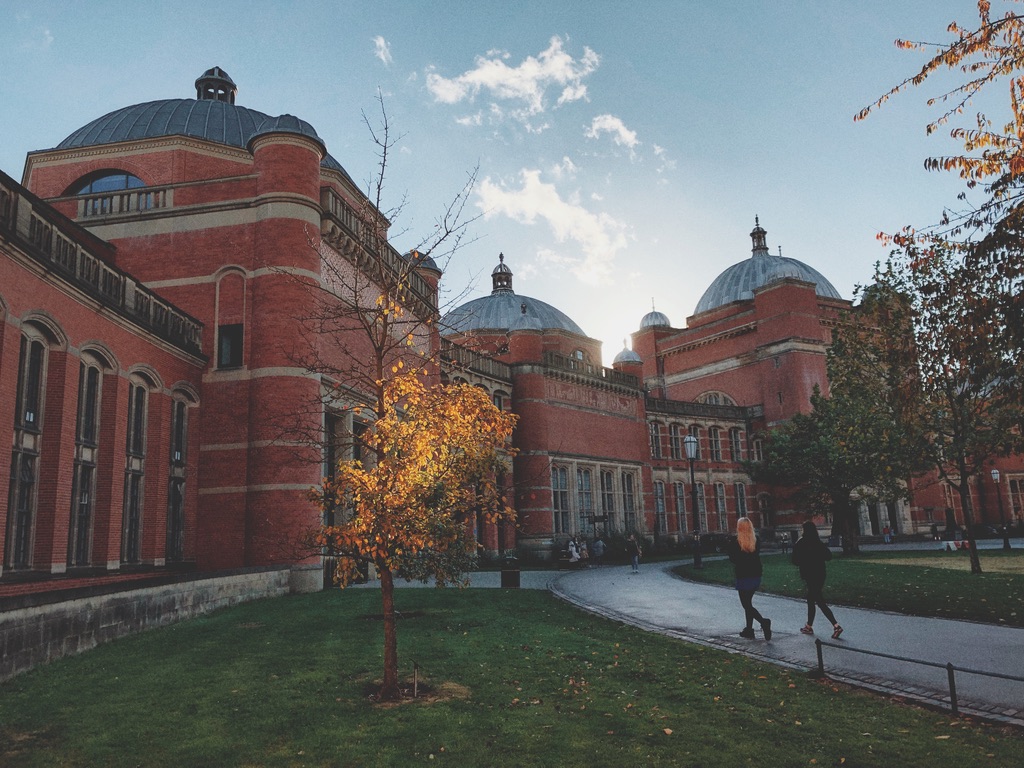
This experience was the first example of a fact that become more apparent as I progressed through my education: physics (STEM in general, really) can take you to a lot of really cool places you might not otherwise get to see. Because so many people from Freedom, PA stay there forever, it was exciting to realize how much there is to see and even more exciting to realize that the subject I loved studying could help me see it. I returned from Birmingham eager to graduate from Clarion and move on to the next step in my academic career.
Fulbright, NSF, and Boulder
In my third and final year at Clarion, I spent a lot of time preparing applications for the next step: graduate school. There are many programs that will fund US students' graduate education in the United States and abroad. After my time in Birmingham, I knew I wanted to return to England. So, I prepared applications for three international fellowships: Fulbright, Marshall, and Rhoades. While waiting on these applications, I also applied to domestic fellowships, many of which are funded by the US government. I applied to the National Science Foundation's Graduate Research Fellowship program, the Department of Defense's NDSEG, and the Fannie and John Hertz Foundation Fellowship (the most selective fellowship one can win in physics, I believe.) Lastly, I applied to several graduate physics programs in the US. Some around home, some across the country. Long story short, I casted a fairly wide net and hoped for the best. The key take away is to research sources of funding long before you actually need to apply to them. Knowing what the funding source is looking for allows you to tailor your acitivies, and thus your resume (or CV), in a way that could make your application more competitive. After the applications are all submitted, all that is left to do is wait... and wait...
The period between application submission and first responses is a weird form of purgatory. A lot of one's future is up in the air during that time, or so it feels. The only way I was able to stay sane was by making back-up plans. What happens if I get an international fellowship but rejected from domestic schools? What happens if I get rejected from international fellowships but accepted to every domestic school? What do I do if I get rejected from everything? I believe at one point I had made plans A through H. This gave me piece of mind and I recommend it to any student applying to anything from a summer job to the school of their dreams.
Thankfully, after months of waiting, I started to receive responses! Rejected from Hertz (no surprise there), rejected from NDSEG, rejected without an interview from Marshall and Rhoades scholarships (still a tad salty about these rejections), and finally... an acceptance!
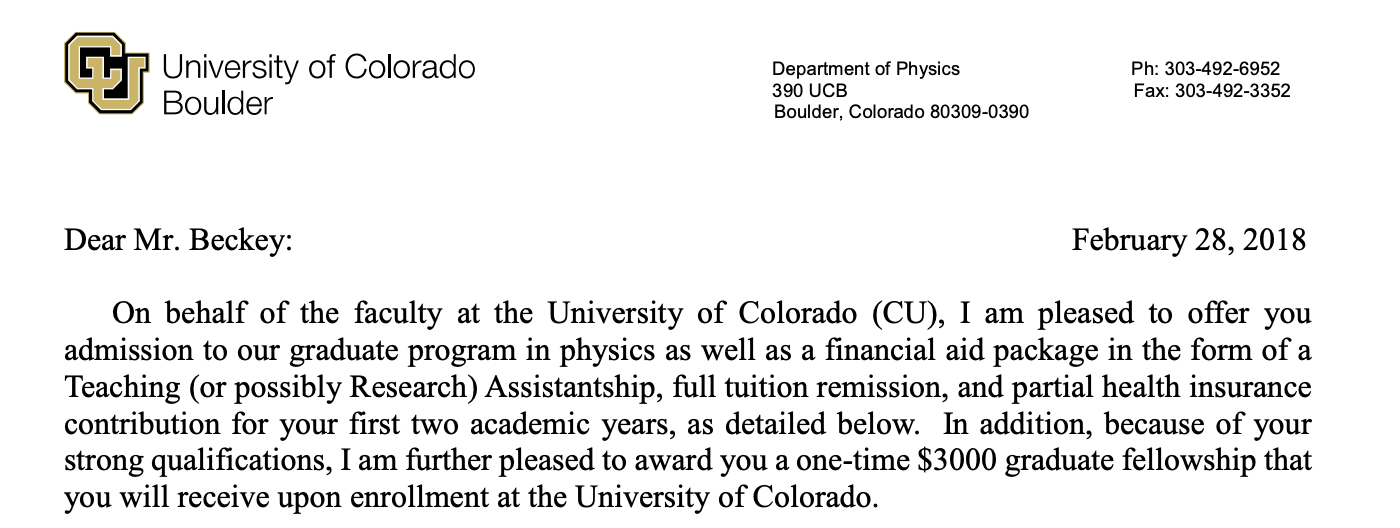
About a month after getting into Boulder, I was certain that I should have at least heard back from NSF. Late one night, when I couldn't stop thinking about hearing back, I checked my spam folder. I almost passed out when I saw the response in my spam folder... It had been there for over a week.
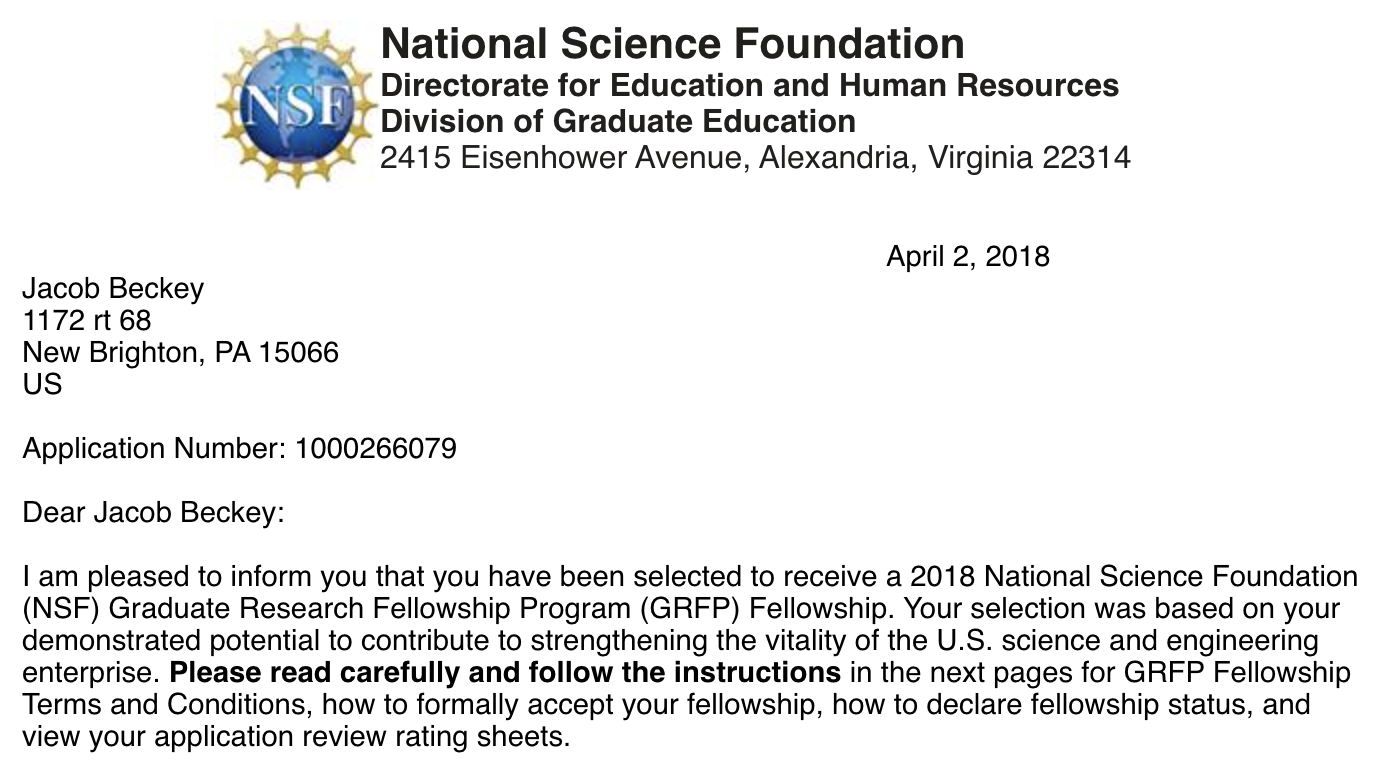
Its hard to fully express how good it felt to get into the school of my dreams and have the first few years funded by the government. I did not think life could get much better and then I received the final bit of fantastic news, making 2018 one of the most exciting years of my life.
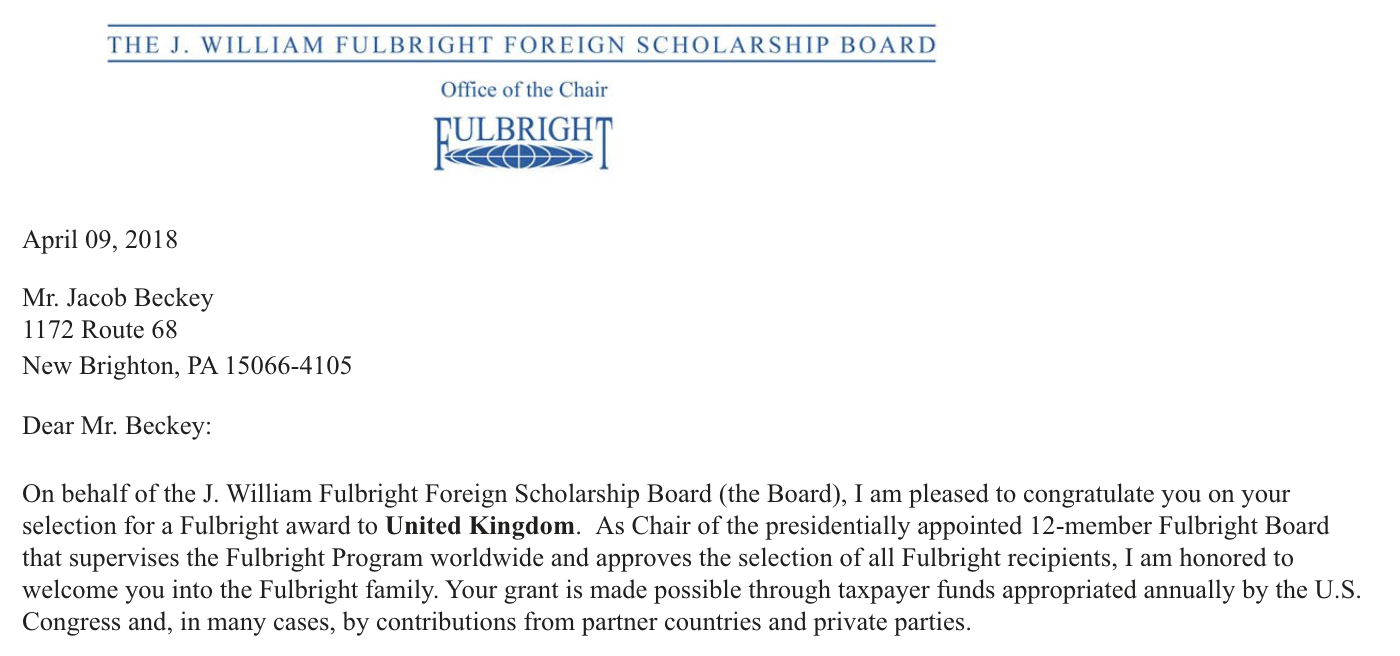
To this day I cannot believe these three opportunities worked out in my favor. Although many, many rejections occurred along the way, it felt as though my hard work had finally paid off. Going from graduating 57/114 in my high school class to winning competitive national scholarships made me very proud of myself and thankful for the people in my life that made it happen: Dr. Brian Wargo (Freedom), Dr. Sharon Montgomery (Clarion), Dr. Chunfei Li (Clarion), Dr. William Naugle (Clarion), and of course my family and friends.
My main motivation for writing this was for students at Freedom to see what is possible in physics. I certainly did not know what a physicist did when I was at Freedom. I am still very much learning as I go, but I plan to share as much as I can along the way in order to help as many students as possible.
If you made it this far, thank you! Please feel free to reach out to me at the email in the footer of this website with any comments or questions you may have.